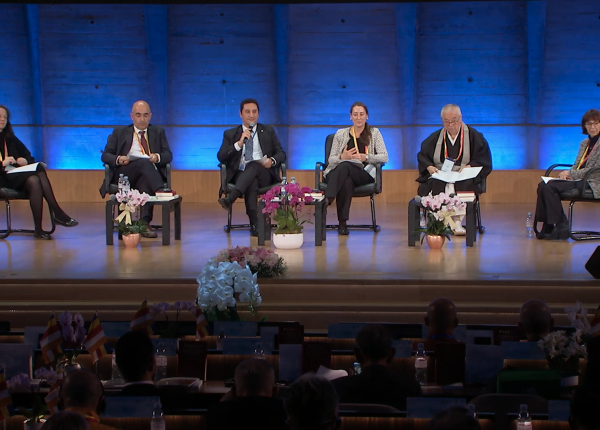Round table at UNESCO – How interfaith dialogue is building inclusive and peaceful societies

On October 28-29, 2024, the World Fellowship of Buddhists (WFB), in collaboration with the Kingdom of Thailand, hosted an inspiring two-day international conference. The event brought together UNESCO’s interfaith NGO partners, including eight leading organizations, to showcase the essential role of religions and spiritual traditions in fostering a culture of peace and non-violence through education.
New Humanity NGO, through the NGO-UNESCO Liaison Committee, played a central role in supporting this initiative, organizing a round table to demonstrate how interfaith and intercultural dialogue can drive united human values, even in a challenging world.
Key Takeaways from the Round-Table
Several influential speakers shared valuable insights during the round-table, shedding light on diverse perspectives:
- Bérengère Savelieff (Pax Christi): Presented a compelling case for inter-religious collaboration based on a UN resolution, sharing a field experience from the Congo that demonstrated how dialogue drives actionable change in conflict-affected areas.
- Maria Teresa Siniscalco: Showed how interfaith dialogue enriches school education, with examples from schools in Pakistan and Slovenia, illustrating its role in building bridges between young people of different backgrounds.
- Reverend Youshiharu (WFB & Religions for Peace Japan): Explored how interfaith approaches address ethical dilemmas in emerging fields like Artificial Intelligence, showcasing the relevance of spiritual perspectives in modern challenges.
- Professor Fabio Petito: Argued for closer collaboration between religious organizations and governments, emphasizing that this partnership is essential for tackling contemporary global issues effectively.
Building Momentum for Action
The discussions also served as a platform to strengthen the role of interfaith dialogue in global policymaking. Panelists and participants expressed their willingness to present the work of the NGO-UNESCO Liaison Committee to key delegations, including those of France and Italy, to garner support for a UNESCO resolution. The next step involves reaching out to additional member states of UNESCO’s Executive Board to build broad-based backing.
Furthermore, the round-table reinforced the unity and commitment of the NGO-UNESCO Liaison Committee. This shared sense of purpose will drive ongoing initiatives, including a magazine project led by Pax Christi. The magazine will highlight the committee’s collective achievements, further advancing advocacy efforts with UNESCO member states.
Why This Matters
The conference was a powerful reminder that inter-religious dialogue is not just theoretical; it creates real, measurable change. From shaping educational practices to addressing complex ethical questions, it fosters collaboration that transcends cultural and religious boundaries.
We invite you to watch the sessions and be inspired by the stories and strategies shared:
- October 28 Morning Session | October 28 Afternoon Session
- October 29 Morning Session | October 29 Afternoon Session


